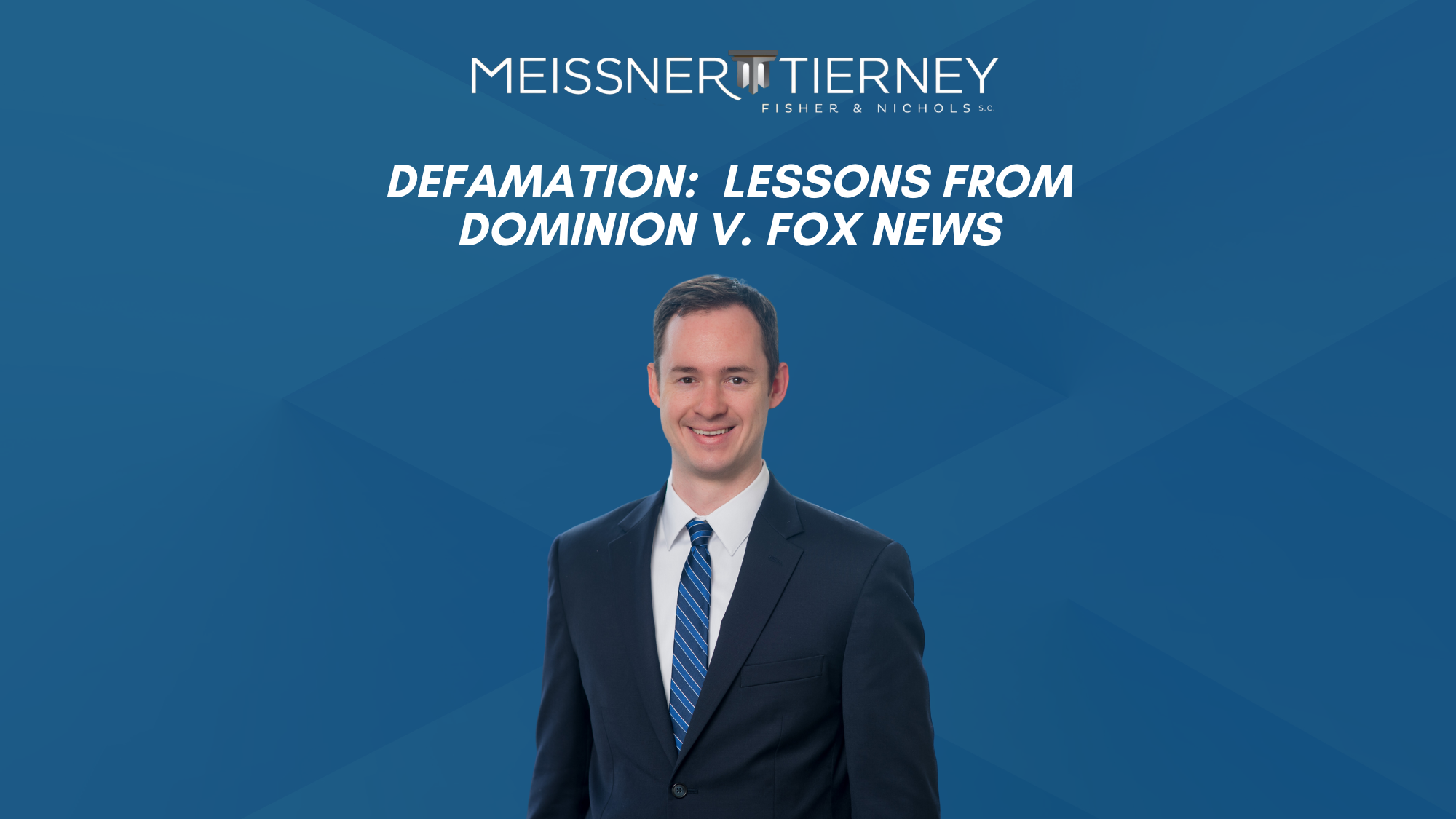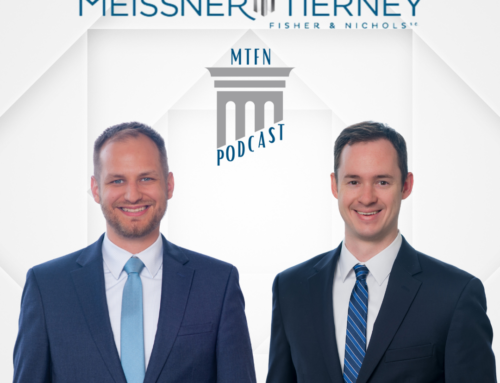On April 18, 2023, on the eve of trial, Dominion Voting Systems and Fox News Network agreed to settle Dominion’s Delaware defamation lawsuit against Fox News[1] based on statements made on Fox News that Dominion rigged the 2020 U.S. presidential election.[2] It was soon reported that Fox News had agreed to pay Dominion $787.5 million to settle the case.[3]
Everyone has heard the adage, “sticks and stones may break my bones, but words can never hurt me.” So how do words lead to billions of dollars in alleged damages and nine-figure settlements?[4] By comparing the facts of the Dominion case with Wisconsin cases, one can better understand the ins and outs of defamation law in Wisconsin.
The defamatory comment must be a statement of fact.
In Wisconsin, the elements of defamation are: “(1) a false statement; (2) communicated by speech, conduct or in writing to a person other than the one defamed; and (3) the communication . . . tends to harm one’s reputation . . . .”[5]
For someone to commit defamation, the potentially defamatory statement has to be a statement of fact—something that is either true or false. In other words, the statement cannot be a pure opinion.
Whether something is a matter of fact is not always so clear. For example, in Laughland v. Beckett,[6] a Wisconsin case, Beckett made a fake Facebook account in Laughland’s name and used the profile to post nasty messages about him, often in the first person, such as the following:
“It is nice being a loser and taking advantage of banks and credit card companies. I am not sure why more people have not caught onto the fact that I am a low life manipulative person.”[7]
Beckett argued that these statements were simply his opinions, and therefore not defamatory.[8] The Wisconsin Court of Appeals disagreed, stating, “we conclude that Beckett’s statements were all variations of the underlying (and unsubstantiated) factual assertion that Laughland engaged in fraudulent financial activity.”[9] This factual assertion was enough to support the defamation claim.
In Dominion, Dominion identified four general factual statements made by Fox News as the basis for its defamation claims: Fox News stated that Dominion “committed election fraud; manipulated vote counts through its software and algorithms; is founded in Venezuela to rig elections for dictator Hugo Chavez; and paid kickbacks to government officials . . . .” [10] While Fox News argued that the statements made were opinions, as opposed to facts, the court held that each of these allegations is a matter of fact because they could be objectively shown to be true or false.[11]
The defamatory comment must be false.
A damaging statement of fact must be false in order to be defamatory. Even if someone divulges secret or otherwise harmful information, if it is true, it cannot be defamation in Wisconsin.
Truth is not always clear-cut. If the court finds that a statement is “substantially true,” it cannot be defamatory. In the Wisconsin case Terry v. Journal Broadcast Corporation,[12] a news station ran a story about a wedding videographer who appeared to be misleading customers. While the videographer’s promo video said the wedding videos would be ready in 10–12 weeks, one couple’s video took seven months and another took over a year.[13] The news station said in its story that the couples “were told their video would be done in 10 weeks,” among other things.[14] The videographer sued the news station for defamation, claiming that the statements were false because she had said it would be 10–12 weeks, which was an estimate, not 10 weeks.[15] The court held that the 10-week statement was “substantially true,” and therefore not defamation.[16]
In the Dominion case, Fox News likely knew it was in trouble following the court’s March 31, 2023 Opinion in which the court concluded that, as a matter of law, the Fox News’s statements were false.[17] This holding is a big issue for Fox News’s defense because, as the court explains, the statements create a “presumption of damages to Dominion, who may recover at least nominal damages.”[18] Having the court rule that the statements were false crosses a major evidentiary hurdle by not requiring Dominion to convince the jury that each statement was false.
The defamatory comment must be made to a third party.
For a statement to be defamatory, it must have been made to third parties other than the defamer and the person or business defamed. In Laughland, for example, the defamatory comments were made on Facebook, a public platform.[19] Laughland could see that people were friends with the Facebook page, which meant that they could see the defamatory posts.[20]
In Dominion, since Fox News is a national news broadcasting company, the court held as a matter of law that the Fox News Network “published the [defamatory] Statements by broadcasting the Statements to [its] viewers.” 46. Fox News, with its broad national reach, turned Dominion into a household name, making it easier for Dominion to argue its brand had been irreparably damaged by the false statements.
There must be damages caused by the defamatory comment.
To prevail in a defamation lawsuit at trial, the defamed person or business must be able to show the monetary value of damages incurred because of the defamation. For example, in Laughland, the circuit court awarded $15,000 in general damages and $10,000 in punitive damages based purely on the reputational damage to Laughland.[21] Reputational damage alone, however, may be difficult to prove or place a monetary value on.
In Dominion, the issue of damages was both simpler and more complicated. A business can produce its balance sheet—Dominion provided evidence regarding its projected and actual revenue values for 2021 following the election.[22] The court also noted that damages were hotly disputed and that both sides had retained experts to provide opinions at trial on the damages suffered by Dominion.[23] The court described the inquiry as “intensely factual” but ultimately deferred the assessment of the damage values, including punitive damages, to the jury.[24] With the task of determining damages left to the jury, Fox News decided to bite the bullet at $787.5 million rather than take their chances.
In summary, to prevail on a defamation claim in Wisconsin, the defamatory statement must be a false statement of fact, it must be made to a third party, and the party claiming defamation must be able to prove damages. In the right circumstances, as shown in Dominion, the potential damages in a major defamation claim can be nine figures and beyond.
–
[1] US Dominion, Inc., v. Fox News Network, LLC, C.A. No.: N21C-03-257 (Delaware Superior Court, 2021) (applying New York substantive law).
[2] https://press.foxnews.com/2023/04/fox-news-and-dominion-voting-systems-reach-settlement (last viewed 4/28/23).
[3] https://www.yahoo.com/lifestyle/fox-news-dominion-settle-defamation-205800830.html (last viewed 4/28/23).
[4] Id.
[5] Laughland ¶ 22.
[6] 2015 WI App. 70.
[7] Laughland, ¶ 6.
[8] Id., ¶ 27.
[9] Id., ¶ 28.
[10] Dominion v. Fox News, Opinion, C.A. No.: N21C-03-257 EMD at 80 (filed March 31, 2023).
[11] Id. at 79.
[12] 2013 WI App 130.
[13] ¶ 3.
[14] ¶ 17.
[15] ¶ 16–17.
[16] Id.
[17] Opinion at 43.
[18] Id. at 69.
[19] Laughland, ¶ 5.
[20] Id.
[21] Id., ¶¶ 37–39.
[22] Dominion at 67.
[23] Id. at 69.
[24] Id.






